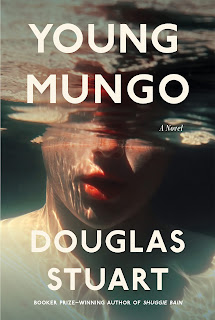YOUNG MUNGO (2022)
By Douglas Stuart
Grove Atlantic, 398 pages.
★★★ ½
What do you do for a second act when your debut novel wins the Booker Prize? In Young Mungo, Douglas Stuart returns to similar turf as his 2020 stunner Shuggie Bain. Critics are slavering over his newest novel but, in my estimation, its first half hews a bit too closely to Shuggie Bain.
Stuart grew up in the Glasgow Springhill public housing scheme spotlighted in Shuggie Bain. Young Mungo’s tenements lie nearby. Stuart also returns to Scotland’s post-Margaret Thatcher 1990’s economic ruination and writes in an uncompromising (and untranslated) Glaswegian patter that is long on verisimilitude but challenging for the Scots-impaired. (Keep your cellphone open to a dialect translation guide as you read Young Mungo.)
Should you read it? Early on I would have said you could give it a miss, but Stuart won me over. The dysfunctional family he spotlights is semi-autobiographical. The Hamiltons are headed by Maureen–called Mo-Maw by her kids (weans or bairns in Scottish)– a single mother who bears the last name Buchan because she never married the departed father of Hamish (19), Jodie (16), and Mungo (15). Mo-Maw is only 34, so do the math and you begin to see the problem. Even were she not a hopeless alcoholic, she has the emotional maturity of a teenager and the equivalent indifference to adult responsibility. Hamish has been feral for years and though he has a flat of his own for his 15-year-old wife and wean, he basically lives on the streets. Jodie despises her mother for forcing her to become the de facto caregiver for Mungo.
Jodie loves Mungo dearly, but Mo-Maw thinks nothing of disappearing for weeks on end to pursue a boyfriend du jour–food, rent and household costs be damned. Her kids call her a Tattie-Bogle, a scarecrow and a heartless one at that. The sandy-haired Mungo, whose name derives from the nickname for Kentigern, Glasgow’s patron saint, is a sweet lad that all women want to mother. That’s especially so when they observe a bad rash on one of his cheeks, a result of constantly scratching it and an indication of his internalized anxiety. Another telling trait is his child-like (and sometimes inappropriate) devotion to Mo-Maw.
NPR has called Young Mungo a novel soaked in “toxic masculinity,” an apt way of describing it. Mungo is named for a saint, but he’s a “Proddie” (Protestant) whose tenement lies on one side of a motorway bridge with equally seedy Fenian (Catholic) flats on the other. The gang violence is analogous of that of Belfast. The Proddies are led by Hamish, a crude, bullying, vicious man who carries (and uses) a homemade tomahawk. He demands that Mungo join him in bloody punch-ups and raids against the Fenians. The only thing the two sides agree upon is that they hate “poofters” (gays).
Poverty rules in both tenements and each harbors a hatred for Thatcherism, so you might wonder why the sectarian violence. When Mungo asks his hot-headed brother that question, Hamish can’t articulate a reason other than “it’s an honour thing, I guess.” Wonder what might happen if a Proddie boy fell in love with a Fenian boy? Read Young Mungo.
Stuart has two parallel stories going. The first is Mo-Maw’s feeble attempt to make a “man” of Mungo by sending him off on a fishing trip to a rural loch with two older men. Memo: Don’t send your kid off with two guys you met at an AA meeting who have been in prison for sexual offenses. The second narrative is in Glasgow and involves the burgeoning relationship between Mungo and James Jamieson, a Catholic. One is a tale of abuse; the other is tender but problematic in a culture in which difference makes a difference.
Mungo is a lovable character for whom we root, but Young Mungo is like Shuggie Bain in that it is a “tough” book spotlighting struggles that are not easily overcome. Mungo’s face rash is symbolic of how society scars innocence. Rashes heal, but will Mungo? Or James? Jodie? Mo-Maw? How far can good intentions take you amidst squalor, hatred, and violence?
Young Mungo is powerful, but I again wonder whether if Stuart’s take is Shuggie Bain in new guise. Stuart is a wonderful writer and I will try anything he pens. Here’s hoping his next novel tills new soil.
Rob Weir

No comments:
Post a Comment